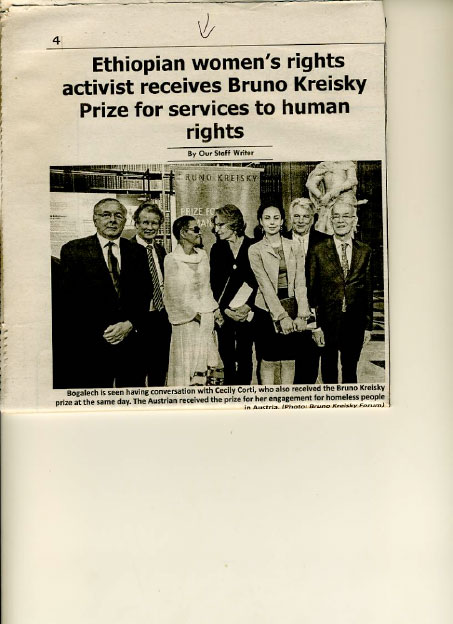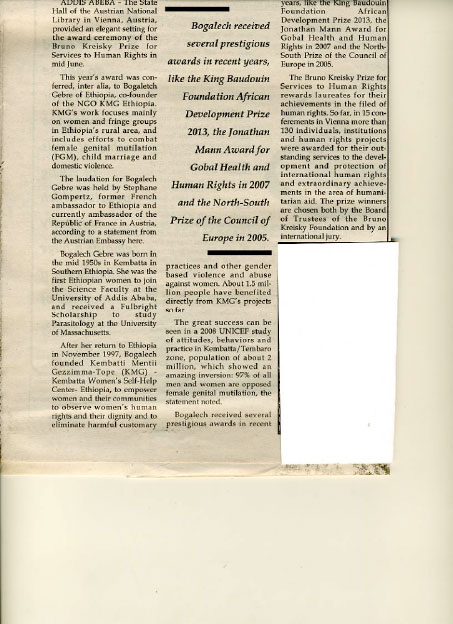



06/11/13 Kreisky Prize for reporter imprisoned in Syria > KleineZeitung
www.kleinezeitung.at/nachrichten/politik/3330700/kreisky-preis-fuer-syrien-inhaftten-reporter.story 1/1
Last updated: 06/10/2013 at 07:26
The Bruno Kreisky Prize for services to human rights goes to the
Syrian journalist and activist Mazen Darwish, who has been in power by the regime since February 2012
being held in custody under President Assad. Darwish will be honored for standing up for
freedom of the press and the disappearance of reporters in his
The reason given was that I had drawn attention to my homeland.
Darwish established the Syrian Center for Media and Freedom of Expression (SCM) in 2004
founded together with other activists and, according to the broadcast, about the
reported the situation of political prisoners in his home country. Because of his
A travel ban was imposed on Darwish for Engagements back in 2007.
He was arrested several times, most recently in February 2012 when the offices were stormed
his organization. To date he has not been released. His wife will take his place
Yara Bader presented the award on Monday evening at 7:00 p.m. in the state hall of the National Library in
receive Vienna.
The Ethiopian human rights activist Bogaletch Gebre is also honored loudly
Kreisky Foundation for her tireless and successful fight against women
genital mutilation in their home country. She and her sister have them
"Kembatti Mentti Gezzimma-Tope" (KGM) group was founded, which operates in Ethiopia to this day
campaigns for women's rights and marginalized groups. In addition to this, the KGM
women's health and education programs.
As a third party, Cecily Corti, chairwoman of the St. Vincent Community of St. Stephen and
Co-founder of the homeless facility VinziRast in Vienna, the award. the
VinziRast in Vienna-Meidling is an emergency shelter with 48 additional beds for the homeless
the VinziRast-CortiHaus with 16 apartments was added in 2008 and in 2011
opened a residential community for alcoholic homeless people. Corti has been among others with
the Golden Medal of Merit
06/11/13 Ethiopian women's rights activist in Gebre honored- dieStandard.at› Politics
diestandard.at/1369363188974/Aethiopische-Frauenrechtesaktivistin-Bogaletch-Gebre-excellent 1/2
© derStandard.at GmbH 2013
I
Your educational work has contributed to that
the number of circumcised girls in Ethiopia fell sharply
Vienna – The Ethiopian women's rights activist Bogaletch Gebre receives the Bruno Kreisky Human Rights Prize for her work against genital cutting in her home country. through her
The use and work of their group "Kembatti Mentti Gezzimma" (KMG) was able to increase the number of new
circumcised girls, according to a study by the United Nations Children's Fund UNICEF from 2008
be reduced to zero. The award ceremony will take place in Vienna on Monday evening.
Men and women involved in discussion processes
KMG was founded in 1997 by Bogaletch Gebre and her sister Fikrte. The work against FGM
picked up the group in 2000. Her approach is awareness and educational work in the
respective villages and towns. It is important at work that both men and women
of all ages can be involved in the process. “In addition to that, we had at the
Two people also took part in rounds of talks who provided basic facts on the subject. About,
that neither the Bible nor the Koran says anything about genital cutting, what are the risks
circumcision for girls and that many have died from it.” In Ethiopia included
circumcision traditionally involves cutting away the clitoris, as well as the inner and outer
Labia.
“We allowed the groups to have a week-long discussion process before they closed themselves
came to the conclusion that this practice had to be stopped," explained Gebre. According to Gebre
Genital cutting is neither an Ethiopian nor an African tradition. "I don't know where that came from
phenomenon is coming,” she said. It is obvious that it serves this purpose in a patriarchal system
To control and subdue women and deprive them of their sexual desire.
Demonstrative marriage
The first major success was achieved just two years after the organization started its activities
be recorded: A young couple decided to get married. “She was uncircumcised and the two
celebrated their wedding in public,” said Gebre happily. “There were 3,000 guests in total
came and the religious leaders blessed the marriage in front of all.” Thereupon was a kind
Competition arose in the neighborhood: “Suddenly everyone wanted an uncircumcised woman
get married,” said the award winner.
"I don't know if I won the fight. We are making achievements in the communities,”
said Gebre. “But there are numerous areas in addition to circumcision where the rights of
Women are being hurt.” The work is only done when women have the same rights and freedoms
and would possess the same value as men. “I hope that violence against women in the name
tradition will end one day," said Gebre. Every culture that violates human rights is a
System that should no longer be accepted in the 21st century. (APA, June 10, 2013)
link
Kembatti Mentti Gezzimma Ethiopia
dieStandard.at › PoliticsJune 11, 2013 Ethiopian women's rights activist in Gebre honored- dieStandard.at› Politics
diestandard.at/1369363188974/Aethiopische-Frauenrechtesaktivistin-Bogaletch-Gebre-excellent 2/2
APA0020 / 10.06 Mon, Jun 10, 2013
Syrian Mazen Darwish honored for his commitment to freedom of the press, Ethiopian Bogaletch Gebre in the fight against genital mutilation and Austrian Cecily Corti for his commitment to the homeless
Damascus/Addis Ababa/Vienna (APA) - This year's Bruno Kreisky Prize for services to human rights goes to the Syrian journalist and activist Mazen Darwish, who has been imprisoned by the regime under President Bashar al-Assad since February 2012. Darwish was honored at the suggestion of the international award commission because he campaigned for freedom of the press and drew attention to the disappearance of reporters and bloggers in his home country, the Kreisky Foundation justified its choice.
Darwish founded the "Syrian Center for Media and Freedom of Expression" (SCM) together with other activists in 2004 and, according to the broadcast, reported among other things on the situation of political prisoners in his home country. Because of his commitment, a travel ban was imposed on Darwish in 2007. He was arrested several times, most recently in February 2012 when his organization's offices were stormed. To date he has not been released. In his place, his wife Yara Bader will accept the award on Monday evening at 7:00 p.m. in the state hall of the National Library in Vienna.
According to the Kreisky Foundation, the Ethiopian human rights activist Bogaletch Gebre is also honored for her tireless and successful fight against female genital mutilation in her home country. Together with her sister, she founded the "Kembatti Mentti Gezzimma-Tope" (KGM) group, which still campaigns for women's rights and marginalized groups in Ethiopia. In addition, KGM implements women's health and education programs.
Cecily Corti, chairwoman of the Vinzenzgemeinschaft St. Stephan and co-founder of the homeless facility VinziRast in Vienna, is the third person to receive the award. The VinziRast in Vienna-Meidling is an emergency shelter with 48 beds for the homeless. In addition, the VinziRast-CortiHaus with 16 apartments was opened in 2008 and a shared flat for alcoholic homeless people in 2011. Corti has been awarded the Gold Medal of Merit for services to the Republic of Austria.
(SERVICES: SCM: http://scm.bz/?lang=en, KGM: http://kmg-ethiopia.org/, Vinzirast: http://www.vinzirast.at/)
(final) eleven/fat
APA Mon, Jun 10, 2013
Due to the commitment of Kreisky Human Rights Prize winner Gebre, female genital mutilation in Ethiopia is almost non-existent
present
Vienna (APA) - The Ethiopian women's rights activist Bogaletch Gebre will be honored this Monday evening with the Bruno Kreisky Human Rights Prize for her efforts in the fight against female genital mutilation in her home country. "We are making progress," she told APA, referring to the global and Ethiopian women's rights situation. "But we haven't won the fight yet." Thanks to her commitment and the work of her group "Kembatti Mentti Gezzimma" (KMG), the number of victims of genital mutilation was reduced to almost zero, according to a study by the UN children's fund UNICEF in 2008 will.
The group began its work in 2000 and aimed to raise awareness and awareness-raising about the risks of the procedure for the affected girls within rural and urban communities. "We engaged in long discussions and reflection processes with the groups," said Gebre. It is important at work that both men and women of all ages are involved in the process. “In addition to that, we also had two people present at the talks who provided basic facts on the topic. For example, that neither the Bible nor the Koran says anything about genital cutting, what risks circumcision entails for girls and that many have already died from it.” In Ethiopia, the common method was cutting away the clitoris and the inner and outer labia.
"We allowed the groups to have a week-long discussion process until they came to the conclusion that this practice had to be stopped," explained Gebre. A 14-year-old girl once said that her parents protected her and were concerned about her health. "You mustn't do me any harm," she is said to have said. "If they hurt me, then that's a culture of killing." According to Gebre, however, genital cutting is neither an Ethiopian nor an African tradition. "I don't know where the phenomenon comes from," she said. It is obvious that it serves to control women in a patriarchal system and to make them compliant and to rob them of their sexual desire.
Gebre criticized that there was a big misunderstanding in the so-called West that mothers wanted to harm their daughters. "No mother in the world wants to hurt her daughter. They just think it's their duty or that their religion requires it of them,” she explained. Traditionally, circumcision is often seen as preparation for a wedding.
The first major success was achieved just two years after the organization started its activities: a young couple decided to get married. "She was uncircumcised and the two celebrated their wedding in public," said Gebre happily. "A total of 3,000 guests came and the religious leaders blessed the marriage in front of everyone." This led to a kind of competition in the neighborhood: "Suddenly everyone wanted to marry an uncircumcised woman," says the award winner.
"I don't know if I won the fight. We're seeing successes in the communities," Gebre said. "But in addition to circumcision, there are numerous areas in which women's rights are violated." The work is only done when women have the same rights and freedoms and the same values as men. "I hope that one day violence against women in the name of tradition will stop," said Gebre. Every culture that violates human rights is a system that should no longer be accepted in the 21st century.
(The interview was conducted by Mona El Khalaf/APA)